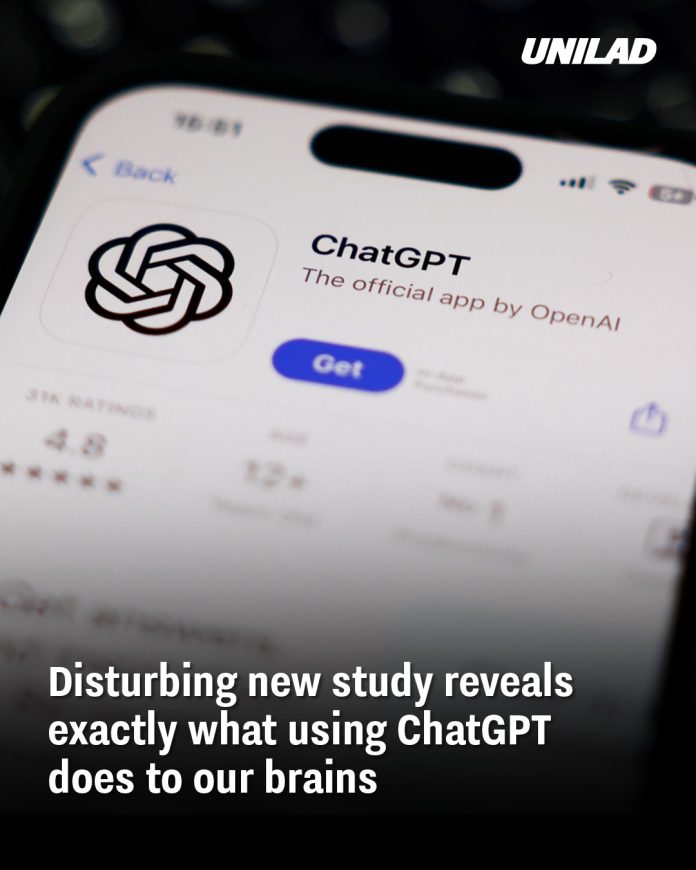A groundbreaking study from MIT’s Media Lab recently explored how using generative AI tools like ChatGPT during essay-writing can reshape our brains. While AI is increasingly useful for speeding up tasks, this study raises concerns that leaning too much on it—especially as a substitute for personal effort—can diminish our memory, creativity, and critical thinking.
1. The Experiment: Three Writing Approaches
Researchers divided 54 participants into three groups:
- Unassisted (“Brain-only”) – Participants wrote essays using only their own mental resources.
- Google-assisted – These writers used search engines to find facts or spark ideas.
- ChatGPT-assisted – Participants used ChatGPT to draft their essays, edit sentences, or generate ideas.
Participants completed three writing sessions with those tools, then switched roles in a fourth session: those who’d used AI had to write without any tools, while the brain-only group could use ChatGPT for the first time.

2. Measuring Brain Engagement
Everyone wore EEG headsets during the writing sessions to track brain activity. The results were striking:
- Brain-only users showed the highest and most widespread neural connectivity—especially in areas tied to memory, creativity, and language.
- Google users showed moderate engagement—less than brain-only, but better than the AI group.
- ChatGPT users exhibited the lowest brain activation, with up to 55% less connectivity in key regions than brain-only participants.
Essentially, the more participants leaned on AI, the more their brains “quieted down” during the task.
3. Cognitive Effects: Memory and Ownership
The study revealed more troubling effects:
- ChatGPT users scored lowest on memory recall: they struggled to remember or quote from essays they had just written.
- These participants also reported feeling less ownership of their work—describing it as less original, more mechanical, and lacking a personal voice.
- By contrast, brain-only writers felt deeply connected to the ideas and structure of their essays.
4. Creativity and Originality Suffers
AI-generated essays tended to be formulaic and homogeneous, echoing prior findings that large language models produce less diverse ideas than purely human thinking. Over time, participants relied more on copy‑and‑paste routines, bypassing deeper reflection.
5. The Troubles of Overdependence
Key concerns highlighted by the study include:
- “Skill atrophy” – the gradual erosion of critical thinking and problem-solving from too much reliance on AI.
- Cognitive shortcuts – users often accepted AI outputs without evaluating them, weakening analytical skills.
- Surface learning – tasks were processed more procedurally, not deeply encoded in memory.
6. Balanced AI Use – A Silver Lining
Not all findings were negative. In the fourth session, insights emerged:
- Participants who wrote essays unaided then used AI showed boosted brain activity and memory recall—suggesting AI can enrich learning when used after engaging personal effort.
- However, ChatGPT users who switched to tool-free writing continued to underperform, implying habitually outsourcing thought can have a lasting impact.
This supports the idea that AI is most effective when used to augment, not replace, human cognition.
7. What ‘Cognitive Debt’ Means
The researchers coined the term “cognitive debt” to describe how using AI tools as quick solutions can lead to weak understanding and reliance. Like financial debt, cognitive debt accumulates with small shortcuts that eventually weaken our mental muscles.

8. Implications for Education and Beyond
For students—and anyone relying on AI tools like ChatGPT—the takeaway is clear:
- Use AI thoughtfully, not reflexively.
- Practice writing or thinking unaided first to strengthen core skills.
- Engage critically with AI outputs by questioning, editing, and reworking them.
These strategies can help preserve critical thinking, memory, and creativity—skills that are essential in areas far beyond essays.
MIT’s study offers compelling evidence that excessive dependence on AI, especially early in learning processes, can quiet our brains and erode vital cognitive skills. Yet when used strategically—as a supplement to personal effort—AI can enhance, not diminish, our learning. The future likely lies in balanced integration, where technology supports humans—but doesn’t replace them.

















